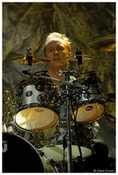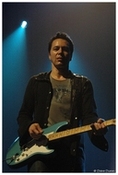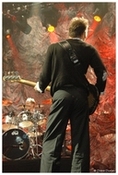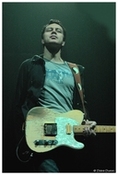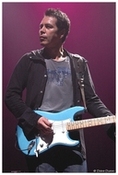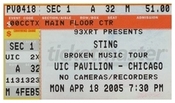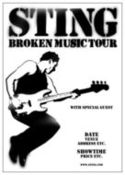
Broken Music
Apr
18
2005
Chicago, IL, US
UIC Pavilionwith Phantom Planet
Sting returns to his roots...
A show by Sting used to have three basic ingredients: the audience would be comprised of mostly women, the set list would culminate with his hooker anthem, 'Roxanne', and at some point in the show, he'd peel off his shirt - sometimes during 'Roxanne' and all the time to the squeals of the ladies.
At the UIC Pavilion Monday night, Sting played to his female contingent but didn't play up to them. And for a rock star who has lately become a shill for luxury cars and bank cards, this time he was not hawking a product. Instead, the former Police frontman was taking a step backward to his earlier work, before his days as a sex symbol for the Oprah crowd. Eleven of the 21 songs were Police songs that dropped off his itinerary years ago ('Demolition Man', 'Invisible Sun'). They were performed, not with an ensemble of backup singers, horns and keyboardists like previous tours, but with a no frills four-member rock band. On this tour of college campuses, he is also making day visits to music theory and composition classes to talk about his early influences - at UIC, he spoke to 30 students the afternoon of the show.
''It's a way to get back to my roots, I suppose,'' he said.
There's good reason. After conquering the world with the Police, Sting set off on an adventuresome solo career that combined rock, jazz, reggae and country. Creatively, his albums gradually slagged as he became less a songwriter and more an iconic symbol of debonair style. His 1999 album 'Brand New Day' required a boost through a tie-in with Jaguar and his 2003 album 'Sacred Love' faltered.
At age 53, it is clear he is seeking rejuvenation. Many of the songs were performed like rediscoveries. Glancing at times to a Teleprompter, Sting dug deep into the rubbery reggae grooves of 'When the World is Running Down' and 'Bed's Too Big Without You' while barking the lyrics to 'Next To You', from the Police's earliest punk days. Many songs sounded like they were written yesterday, including 'A Day in the Life', an unexpected Beatles cover choice performed minus the horns, strings and long suspended piano chord.
Yet there was no denying this remained a star trip. Although the set list was from his band days, there was little band interaction. Perhaps it's to the credit of former Police players Stewart Copeland and Andy Summers that drummer Josh Freese and guitarists Dominic Miller and Shane Fontayne could not fully capture the dynamics and intensity that made that power trio so special. There were moves to replicate Summer's spooky guitar squalls and Copeland's polyrhythms, but they were mostly thin.
Hearing Sting investing new energy into Police songs without the Police begged the question: Why not a reunion? For the time being though, getting an adult contemporary balladeer to rediscover rock is better than nothing. Next up: Rod Stewart?
(c) Chicago Daily Herald by Mark Guarino
Sting cops out...
Sting may have nine solo albums to his name, but it was his work with the Police that was front and center Monday night at the UIC Pavilion in Chicago.
From his opening number, 'Message in a Bottle', to his encore rendition of 'Every Breath You Take' to the more than a dozen tunes in between, this was a concert hard-core Police fans would have loved. And it was far different than his tour last summer, which brought him to Tinley Park's Tweeter Center in support of his bit-of-a-bust, post 9-11 effort, 'Sacred Love'.
Not one song from that album made the UIC set list, and judging from the audience reception, the more Police, the better.
He wasn't kidding when he announced early on that he intended to ''sing a lot of songs that I haven't done in many years.''
You've got to hand it to Sting. He's written some amazing stuff, and if much of it appeared on the four albums he did with the Police, why not lay claim to it. It was lovely to see him trot out songs like 'Bed's Too Big Without You', 'Driven to Tears' and 'Invisible Sun', and avoid some of his more pretentious, self-involved solo work.
For a guy who made his debut in the late 1970s, Sting is aging well. His voice was in tip-top shape, and his appearance was streamlined and dapper as he graced the stage in a brown pin-stripe suit over a black T-shirt.
That said, this is a guy who knows he looks good, and that can't help but come across in his stage presence. Someone ought to whisper in his ear that he'd be well-served to lose some of that self-indulgent jazz scatting and too-cool-for-school strutting and just rock out a little. Let's just say his former bandmates Stewart Copeland and Andy Summers were missed.
But to give credit where credit is due, his jazzier approach to a combo version of 'Voices Inside My Head' and 'When the World is Running Down' worked very well, as did a similar approach to 'Demolition Man'.
Equally enjoyable were songs where he stayed a little more on the traditional pop path, like the simple, but very pretty, version of 'Fields of Gold' and the full-out blast of 'Roxanne', the pre-encore closer.
Probably the most interesting songs of the evening were a version of the Beatles' 'Day in the Life', just different enough from the original to be effective, and 'I Hung My Head', an almost bluegrass tune that was recorded by Johnny Cash.
The show wrapped up with the aforementioned 'Every Breath You Take' coupled with an almost unrecognizable 'Next to You' and an interesting song, 'She's Too Good for Me'. His finale, a mini-encore if you will, was an anticlimactic version of 'Lithium Sunset'.
(c) Daily Southtown by Karen Sorensen
A show by Sting used to have three basic ingredients: the audience would be comprised of mostly women, the set list would culminate with his hooker anthem, 'Roxanne', and at some point in the show, he'd peel off his shirt - sometimes during 'Roxanne' and all the time to the squeals of the ladies.
At the UIC Pavilion Monday night, Sting played to his female contingent but didn't play up to them. And for a rock star who has lately become a shill for luxury cars and bank cards, this time he was not hawking a product. Instead, the former Police frontman was taking a step backward to his earlier work, before his days as a sex symbol for the Oprah crowd. Eleven of the 21 songs were Police songs that dropped off his itinerary years ago ('Demolition Man', 'Invisible Sun'). They were performed, not with an ensemble of backup singers, horns and keyboardists like previous tours, but with a no frills four-member rock band. On this tour of college campuses, he is also making day visits to music theory and composition classes to talk about his early influences - at UIC, he spoke to 30 students the afternoon of the show.
''It's a way to get back to my roots, I suppose,'' he said.
There's good reason. After conquering the world with the Police, Sting set off on an adventuresome solo career that combined rock, jazz, reggae and country. Creatively, his albums gradually slagged as he became less a songwriter and more an iconic symbol of debonair style. His 1999 album 'Brand New Day' required a boost through a tie-in with Jaguar and his 2003 album 'Sacred Love' faltered.
At age 53, it is clear he is seeking rejuvenation. Many of the songs were performed like rediscoveries. Glancing at times to a Teleprompter, Sting dug deep into the rubbery reggae grooves of 'When the World is Running Down' and 'Bed's Too Big Without You' while barking the lyrics to 'Next To You', from the Police's earliest punk days. Many songs sounded like they were written yesterday, including 'A Day in the Life', an unexpected Beatles cover choice performed minus the horns, strings and long suspended piano chord.
Yet there was no denying this remained a star trip. Although the set list was from his band days, there was little band interaction. Perhaps it's to the credit of former Police players Stewart Copeland and Andy Summers that drummer Josh Freese and guitarists Dominic Miller and Shane Fontayne could not fully capture the dynamics and intensity that made that power trio so special. There were moves to replicate Summer's spooky guitar squalls and Copeland's polyrhythms, but they were mostly thin.
Hearing Sting investing new energy into Police songs without the Police begged the question: Why not a reunion? For the time being though, getting an adult contemporary balladeer to rediscover rock is better than nothing. Next up: Rod Stewart?
(c) Chicago Daily Herald by Mark Guarino
Sting cops out...
Sting may have nine solo albums to his name, but it was his work with the Police that was front and center Monday night at the UIC Pavilion in Chicago.
From his opening number, 'Message in a Bottle', to his encore rendition of 'Every Breath You Take' to the more than a dozen tunes in between, this was a concert hard-core Police fans would have loved. And it was far different than his tour last summer, which brought him to Tinley Park's Tweeter Center in support of his bit-of-a-bust, post 9-11 effort, 'Sacred Love'.
Not one song from that album made the UIC set list, and judging from the audience reception, the more Police, the better.
He wasn't kidding when he announced early on that he intended to ''sing a lot of songs that I haven't done in many years.''
You've got to hand it to Sting. He's written some amazing stuff, and if much of it appeared on the four albums he did with the Police, why not lay claim to it. It was lovely to see him trot out songs like 'Bed's Too Big Without You', 'Driven to Tears' and 'Invisible Sun', and avoid some of his more pretentious, self-involved solo work.
For a guy who made his debut in the late 1970s, Sting is aging well. His voice was in tip-top shape, and his appearance was streamlined and dapper as he graced the stage in a brown pin-stripe suit over a black T-shirt.
That said, this is a guy who knows he looks good, and that can't help but come across in his stage presence. Someone ought to whisper in his ear that he'd be well-served to lose some of that self-indulgent jazz scatting and too-cool-for-school strutting and just rock out a little. Let's just say his former bandmates Stewart Copeland and Andy Summers were missed.
But to give credit where credit is due, his jazzier approach to a combo version of 'Voices Inside My Head' and 'When the World is Running Down' worked very well, as did a similar approach to 'Demolition Man'.
Equally enjoyable were songs where he stayed a little more on the traditional pop path, like the simple, but very pretty, version of 'Fields of Gold' and the full-out blast of 'Roxanne', the pre-encore closer.
Probably the most interesting songs of the evening were a version of the Beatles' 'Day in the Life', just different enough from the original to be effective, and 'I Hung My Head', an almost bluegrass tune that was recorded by Johnny Cash.
The show wrapped up with the aforementioned 'Every Breath You Take' coupled with an almost unrecognizable 'Next to You' and an interesting song, 'She's Too Good for Me'. His finale, a mini-encore if you will, was an anticlimactic version of 'Lithium Sunset'.
(c) Daily Southtown by Karen Sorensen

